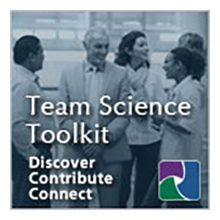Panel Session: Forming and Launching High-Impact Science Teams: Three Models of Team Science Facilitation
Tuesday, August 2, 2022
11:30 PM - 12:45 PM ET
|
Betsy Rolland
Abstract: The initial phases of team formation and launch are critical for creating team processes that support collaboration, communication, and coordination. Yet science teams struggle with engaging in team-building activities while simultaneously starting their scientific work. Team leaders rarely receive training in how to engage in evidence-based team building and may struggle to understand how to integrate available Science of Team Science interventions into their project's lifecycle. Furthermore, few SciTS interventions have conducted evaluations of the long-term impact of their work, leaving team leaders to wonder if the investment is worth it. In this panel, we will highlight three existing team-based interventions designed to facilitate work by teams, focusing on the content of the intervention and existing evaluation data, as well as future plans for continued development and dissemination. First, we will hear about Research Jams, an intervention created by the University of Michigan's CTSA that uses design thinking methods to help mobilize teams toward addressing complex problems. Second, we will hear about Collaboration Planning, an intervention from the University of Wisconsin-Madison's CTSA that facilitates a discussion of how to build evidence-based team processes into the team's approach to collaboration. Finally, we will hear about the Toolbox Dialogue Initiative, a dialogue-based approach grounded in philosophy designed to help teams create common frameworks and mental models to enhance interdisciplinary communication and collaboration. Each of these interventions engages trained professionals to meet a need teams may not even realize they have. Together, these interventions could provide a powerful approach to forming and launching teams that result in higher-impact science.Presentations will be followed by a discussion focused on questions such as:
- Which intervention is right for a given team and when in the team's lifecycle?
- How do the interventions compare and where is there overlap among them?
- Should they be used in sequence or is each stand-alone?
- Is it possible to share evaluation criteria across the interventions to make it easier for teams to compare and choose?
|
|

